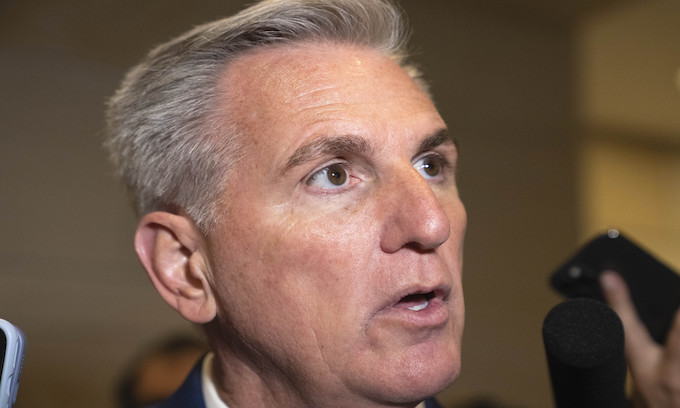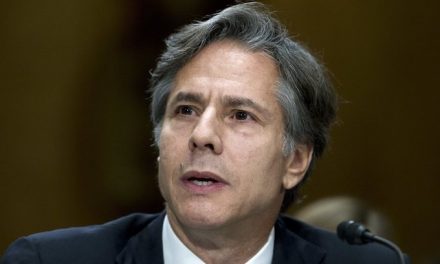Despite hopes earlier in the week that they were moving toward a compromise, House Republicans remain as divided as ever on funding the government with just days left to avert a government shutdown.
While the House of Representatives has passed the military construction and Veterans Affairs (VA) appropriations bill, Congress has failed to send any of the 12 annual appropriations bills required to keep the government operating to President Joe Biden’s desk.
If these bills are not passed, or if Congress doesn’t enact a short-term funding measure called a continuing resolution (CR), the government will go into a full or partial shutdown on Oct. 1, meaning that all nonessential federal employees will be furloughed, while essential employees will be required to continue to work without pay during the shutdown.
However, splits within House Speaker Kevin McCarthy’s (R-Calif.) ideologically-divided caucus have continued to vex Republican leaders, and warring House factions still have a ways to go before coming to an agreement.
The division lies between right-wing members of the House Freedom Caucus (HFC), like Reps. Matt Gaetz (R-Fla.), Bob Good (R-Va.), Ralph Norman (R-S.C.), and Marjorie Taylor Greene (R-Ga.), and moderate lawmakers like Rep. Mike Lawler (R-N.Y.), one of a handful of Republicans representing districts that President Biden won in 2020.
Many HFC members hope for steeper spending cuts and other concessions that Mr. Lawler and other moderates find unpalatable as representatives of highly purple districts.
Divisions over funding for Ukraine, the proper process for bringing appropriations bills, top-line figures for non-defense spending, and the advisability of passing a CR are all hurdles as the government nears a shutdown.
Passing a CR Is Controversial
Several HFC members have demanded that leadership present top-line figures for all the 12 appropriations bills before they vote on the remaining 11 bills.
However, in the time that remains for the House to avert a shutdown, producing these figures poses an insurmountable challenge.
To remedy this, Mr. McCarthy and others in the Republican caucus have pushed for the passage of a month-long CR to keep the government running and give Republicans more time to work out a deal.
Rep. Byron Donalds (R-Fla.), acting as an intermediary for the HFC and the more moderate Main Street Caucus, last week put forward a proposal for a CR that would do just that, while also including provisions to pass a sweeping border security bill that excludes mandating E-Verify—a proposed federal system for employers to check the immigration status of employees.
Supported by members like Rep. Chip Roy (R-Texas), the CR measure was opposed by Mr. Gaetz and others in the HFC, who have expressed opposition to any CR. These members say this short-term solution is just another example of Congress kicking an issue down the road and have instead demanded that leadership produce quantifiable figures for all 12 must-pass spending bills.
After a Sept. 20 meeting of the House Republican conference, which yielded otherwise positive results, according to initial lawmaker reports, Mr. Gaetz said that “more than seven” members opposed the passage of any CR—a number more than enough to make any CR dead on arrival.
Optimistic Signs Short-Lived
Earlier in the week, there were suggestions that the caucus was moving toward a resolution of its key differences, including support for passing a proposed defense appropriations bill, a tentative top-line figure for non-defense discretionary spending, and for a CR.
On Sept. 20 evening, Mr. McCarthy called an evening conference meeting that, on the surface, seemed to produce tangible results.
In a comment indicative of the tone of the evening, Rep. Greg Murphy (R-N.C.) told The Epoch Times that the meeting was “tremendously productive.”
Several came out of the meeting reporting good progress on clarifying and resolving the key differences dividing the caucus.
Earlier in the week, HFC members tanked a Republican defense appropriation bill in a 212–214 vote on grounds that it should be passed only when other spending bills were ready.
After the meeting, Mr. Norman, one of the opponents of the defense bill, told The Epoch Times he would change his vote. He reported that the defense appropriations bill, which had failed to pass the House earlier in the week, seemed set to glide to passage the next morning.
Meanwhile, other Republicans reported that they had reached a tentative non-defense discretionary spending figure that could satisfy right-wing and moderate Republicans alike, constituting a roughly $200 billion cut.
“This is a start,” Mr. Donalds said cheerfully after the meeting. “We have to do a lot of belt-tightening because the future of our country demands it.”
All in all, the tone was hopeful as Republicans streamed out of the closed-door conference meeting, with reports that the worst was over and a compromise had been struck.
But hopes of a resolution were dashed the next morning when, in a striking blow against Republican leadership, the defense bill again failed in a 212–216 vote, including a single no vote from a supporter of the bill, Rep. Tom Cole (R-Okla.), for procedural reasons.
Afterwards, Republicans put forward a motion to reconsider, but tabled a vote on this motion due to a lack of support. Mr. McCarthy ordered Congress into recess for the remainder of the week.
On Sept. 26, Congress will return with only four days left to avert a shutdown, and little hope that it can garner the support for any such measure to do so.
Ukraine Funding
A key area of contention in the spending negotiations involves funding for Ukraine, where many Republicans say too much money has been sent without enough oversight.
Several Republicans, including Mr. Gaetz, Ms. Greene, and others, have demanded that Ukraine funding be left out of the proposed defense appropriations bill, calling for a separate vote on the issue.
Ms. Greene told reporters after the Republican conference meeting that she would be a no vote on any package containing further aid to Ukraine.
In the normal order of Washington, a few Republican defectors for a defense appropriations bill wouldn’t be much of a concern: these bills usually pass in broadly bipartisan votes, with only a handful of dissenters.
However this year, Democrats have voted unilaterally against Republicans’ defense appropriations bill.
House Minority Leader Hakeem Jeffries (D-N.Y.) explained Democrats’ opposition to the bill to The Epoch Times, citing the inclusion of culture war issues, and steep cuts to non-defense spending.
“The defense appropriations bill is a non-starter for a variety of reasons,” Mr. Jeffries said. “I focus primarily on the fact that the legislation is not designed to ensure that our military is in a state of readiness. The Republicans are using the defense appropriations bill to jam their extreme right-wing ideology down the throats of military women, men and families.”
Meanwhile, Republicans have been critical of Democrats for what they see as jamming extreme left-wing ideology down the throats of military service members.
Mr. Jeffries’ response came despite there being a loophole in the House National Defense Appropriations bill that prohibits funding for a Pentagon office dealing with Diversity, Equity and Inclusion (DEI). It will not stop military personnel from implementing and teaching DEI, as proposed by a GOP amendment that sought to prohibit funding from going toward the latter which failed months ago.
Thus, Mr. McCarthy has few votes to spare in order to pass the defense bill.
In view of this, he initially planned to remove Ukraine funding to the tune of $300 million from the bill, but on Sept. 23 reversed that decision, citing procedural difficulties.
This decision means that leadership’s struggle to pass the bill is set to continue into the coming legislative days.
Threats to McCarthy’s Speakership
Undergirding the spending debate is the omnipresent threat that one of Mr. McCarthy’s rivals could put forward a motion to vacate the speaker’s seat.
At the beginning of the 118th Congress, after more than a dozen rounds of voting for House speaker, Mr. McCarthy took the gavel.
However, this position came at a cost to the California Republican: in order to win enough support from the right-wing of his caucus to take the speakership, Mr. McCarthy was forced to substantially weaken his own power.
As part of that deal, Mr. McCarthy allowed a rule change whereby a single member of the House could bring a motion to vacate the speaker’s seat, which would prompt a full vote of the House to determine whether he keeps the gavel. Previously, five members were needed to bring such a motion.
Now, that deal means Mr. McCarthy must tread lightly with the right flank of his conference, who could have him removed from power if he fails to satisfy their core demands.
Mr. Gaetz, the most vocal Republican critic of Mr. McCarthy in the House, has indeed threatened on various occasions to bring such a motion if Mr. McCarthy did not “return to compliance” with the deal made at the beginning of the 118th Congress.
If not for the deal, Mr. McCarthy would be positioned to potentially look across the aisle to make a deal to fund the government. Reps. Jim McGovern (D-Mass.) and Steve Cohen (D-Tenn.) told The Epoch Times that Mr. McCarthy should do just that, but said that he would not due to the threat of a motion to vacate.
In light of the rule change, such a deal with Democrats would almost certainly end in a political fiasco for the speaker, meaning that he finds himself forced to work solely within his party.
Adding to the challenge, Mr. McCarthy can only lose three Republican votes on any measure for the measure to pass.
Challenges From the Senate
Even if Mr. McCarthy can find a deal that will satisfy both the moderates and the HFC, he’ll then face the challenge of a hostile Senate.
Any spending bill that passes the House would then need to win the support of the Senate, where Democrats hold a one-vote majority.
Democrats in the Senate say that the fault for any prospective shutdown will lie with Mr. McCarthy.
Asked whether the government will shut down, Sen. Gary Peters (D-Mich.) said, “That’s up to McCarthy.”
When Sen. Peter Welch (D-Vt.) was asked whether Republicans would be to blame for a shutdown, Mr. Welch said, “They’re the only ones who have a significant element in their caucus advocating for it.”
Sen. Richard Blumenthal (D-Conn.) agreed, saying it’s “pretty obvious” who would be to blame for a shutdown.
“I think the blame should go … where it obviously belongs,” Mr. Blumenthal said. “And that would be the House and the House GOP right now is seemingly totally dysfunctional.”
Republicans, meanwhile, say that a shutdown will be the fault of Senate Majority Leader Chuck Schumer (D-N.Y.) and President Biden if they fail to meaningfully negotiate with the House on cost-cutting measures.
Sen. Ted Cruz (R-Texas) said a shutdown would be “really, really beneficial” for President Biden and Mr. Schumer.
“The media will happily play the Republicans and they think they’ll get a political benefit from it,” Mr. Cruz said, suggesting they had failed to make enough of an effort to avert such a shutdown. “So it is extremely likely that we see a Biden and Schumer forced shutdown.”
Sen. Josh Hawley (R-Mo.) said, “My view is this, that there is no reason for a shutdown.”
Asked whether he agreed with Mr. Cruz’s assessment, Mr Hawley said, “My guess is [Biden and Schumer are] secretly cheering—or not so secretly cheering—for it.”
As lawmakers return to Capitol Hill this week, they face the near certainty of a shutdown with no clear path out of the stalemate.



















Here we go again: In Sept. 2013 the government was shut down because the Democrats would not except any of the money that the House of Representatives authorized to completely fund the government Except Obamacare.
Of course the Democrats blamed the GOP for the shutdown, in reality it was the treasonous Democrat party’s refusal to except any of the money unless it included funding for the disgraceful Obamacare.
Sept. 2013 “The American people don’t want the government shut down, and they don’t want Obamacare,” the Ohio Republican said to applause and cheers. “The House has listened to the American people. Now it’s time for the United States Senate to listen to them as well.”
Now today the Democrats threaten to shutdown the government unless they are given a blank check to continue to overspend money that we do not have and will have to increase the national debt by borrowing more money from China
Abraham Lincoln once said,” A House Divided Against It’self Cannot Stand..We Will have to see what happens.
SHOT UT DOWN.. Especially the FBI and dept of injustice!!
” Clearly, a ciilization that feels guilty for everything it is and does will lack the energy and conviction to defend it’self.”
Jean Francois Revel
But the grifters in Ukraine will continue to get money even if American citizens go without.
UNTIL WE as a nation, tell our congress “ENOUGH!”
Please don’t comprimise. Shut down the whole disgusting gubment thing. Save us the taxpayers a ton of money.